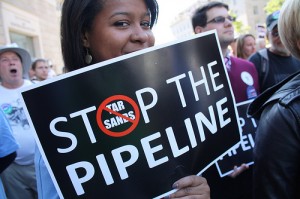Independent Voters Favor Renewable Energy Over Keystone XL Pipeline By 4-1 Margin
 Environmental groups celebrated last fall when President Obama delayed the northern portion of the Keystone XL pipeline, a project that would pipe carbon-intensive tar sands crude from Canadian strip mines to refineries in Texas.
Environmental groups celebrated last fall when President Obama delayed the northern portion of the Keystone XL pipeline, a project that would pipe carbon-intensive tar sands crude from Canadian strip mines to refineries in Texas.Now that Obama is back in the White House for a second term, those same forces are banding together to encourage the president to kill the pipeline altogether.
A new poll suggests that these groups have public opinion on their side.
The polling outfit Zogby Analytics has just conducted a survey showing very strong support for renewable energy and minimal support for the Keystone pipeline among centrist voters.
According to the poll, which was released by the National Wildlife Federation, independent voters say they would choose renewable energies like wind and solar over Keystone XL by a 4-1 margin. Only 12 percent chose Keystone as a priority. And among all voters surveyed across party lines, renewables received twice the support as fossil energies.
The survey doesn’t tell us how voters feel about killing the Keystone pipeline outright. And the comparison in the survey — which conflates electricity generation technologies like wind and solar with liquid transportation fuels that the Keystone pipeline would support — doesn’t accurately reflect the differences in energy types. But to the average voter, that doesn’t really matter.
The important finding from this poll is exactly what we’ve seen in many others over the years: Americans of all political persuasions really like renewable energy and will almost always choose it as a priority over fossil fuels.
That strong support for renewables and other clean technologies over fossil fuels was the premise of a pre-election report from the Center for American Progress. That report — designed to directly challenge the American Petroleum Institute’s multi-million dollar campaign promoting unprecedented fossil fuel development — laid out balanced regional strategies for advancing clean technologies that voters say they prefer.
As it turned out, the API campaign didn’t convince voters. And after countering hundreds of millions of dollars in ad spending from groups promoting Keystone XL and expanded fossil fuel drilling, many environmental groups are feeling energized about where they stand post-election.
Broadly speaking, it looks like voters continue to stand with them.
Consider the results in races where the Keystone XL pipeline played a prominent role. In the swing state of Florida, Senator Bill Nelson was attacked repeatedly by his Republican challenger for opposing the Keystone Pipeline. He won by a large margin.
“The Nelson race was supposed to be a showdown on Keystone and it was a blowout,” said Jeremy Symons, senior vice president of the National Wildlife Federation, at a press conference the day after the election.
In fact, every single Senator who opposed the Keystone XL pipeline won their races this election.
According to a Climate Progress analysis of ad spending using Kantar Media CMAG data, $1.8 million was spent on Keystone XL-related ads since September in Virginia and New Mexico — both states that elected candidates supported by environmental groups.
The Zogby poll also shows broad support for other environmental initiatives. According to the survey, 44 percent of voters say the government is doing too little to protect clean air, clean water, and other natural resources. Only 14 percent say the government is doing too much in this area. In addition, 65 percent of respondents said that political leaders need to act now in order to address future climate impacts.
These findings come as environmental groups begin crafting their post-election strategies on climate, environmental protections, and renewable energy promotion.
The Keystone XL pipeline is first on the priority list for many groups. This Sunday, the climate activist organization 350.org is leading a rally in Washington against the project. Other major groups are expressing their desire to push the White House on Keystone as well.
“We want the President to take a long, hard look at the Keystone pipeline and reject it outright,” said Michael Brune, president of the Sierra Club, at a press conference. “This is a priority for us.”
You can return to the main Market News page, or press the Back button on your browser.

